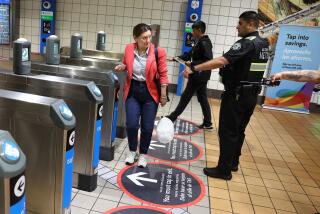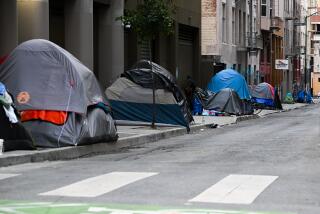‘Spare Change’ Refrain Putting Urban Pedestrians, Panhandlers At Odds
- Share via
BOSTON — A neatly groomed young man with a spring in his step was headed through the downtown throng on his lunch break when the hand shot out at him. “Spare change?” he was asked.
Nick Jamales, businessman, meet James Purdy, ex-convict and panhandler.
Jamales stopped for a moment, dug into in his pocket and pulled out a few quarters. He dumped them into Purdy’s waiting palm, then continued on his way. Purdy kept standing there, hand outstretched.
It is a scene played out on a busy Boston street, but it could be anywhere in urban America, as panhandlers and pedestrians cross paths ever more frequently.
Even in the best of times there have been a few beggars. Now panhandlers crowd street corners and public parks, and urban dwellers complain that the beggars are becoming more aggressive.
Jamales, 27, says he is asked for money at least a dozen times a day.
“Once I gave this guy a dollar and told him to get something to eat with it,” he said. “He started screaming that he was going to get drunk.”
Usually, the beggars’ pleas are quiet. Occasionally, they turn ugly.
In New York, a secretary was slashed across the face by a panhandler angry that she wouldn’t give him a dollar. And a 15-year-old who could speak only one phrase in English--”Give me a dollar”--was charged with stabbing in the heart an 18-year-old who refused to give him money.
In response, some cities have passed anti-panhandling ordinances. In Cincinnati, a church hired an off-duty police officer to keep beggars off church grounds and protect parishioners’ cars from vandalism. Officials in Berkeley, Calif., are trying a system in which panhandlers are given vouchers instead of change to buy goods and services.
Beggars say people have become more hardhearted.
“This guy in a suit came up to me, gave me a dime and said, ‘Spend it wisely,’ ” said Nelson Boulter, a panhandler for many of his 58 years.
“Ten, 12 years ago, people were friendly. Now they look down on you,” Boulter said as he stood in front of a Boston subway station in a chill wind. “Times are hard. Rent’s gone up, food’s gone up. They’ve got their own lives to live.”
The Washington, D.C.-based Coalition for the Homeless estimates that there are anywhere from 700,000 to 3 million homeless people in this country and says the number is growing.
Not all homeless people are panhandlers, and vice versa, but the number of beggars on the streets continues to rise along with unemployment and poverty, said Joan Alker, the coalition’s assistant director.
In Boston, panhandlers seem to be everywhere.
There is the frail woman who holds out a plastic cup in front of the Chinese cinema in Chinatown, where posters display alluring Hong Kong starlets; the friendly man named Michael, who greets subway commuters with a smile each morning under the elms at Boston Common; the purple-haired teen-agers dressed in black leather who sit idly in front of a convenience store in seedy Kenmore Square.
Here and elsewhere, beggars wait outside restaurants and ask for doggie bags, or stand in busy intersections and wash windshields. They hold the doors for people using automatic cash machines. Some make their begging into a joke, promising to spend the money only on booze, not food, or say they are collecting nickels to buy a condo.
Whatever the method, the encounter is always uneasy as beggars swallow their pride and in turn inspire guilt, or fear.
“People in cities are becoming more frustrated,” Alker said. “No one likes to see people begging. It makes everyone feel guilty at some level, and as time goes on they start to blame the victim.”
Boulter knows. He’s heard the insults. And he admits that many beggars drink away their money and that some are con artists.
Others, though, can’t see any other way to survive. Boulter says what he doesn’t spend on food, he tries to save to rent an apartment. These nights, he sleeps in a homeless shelter.
“This is a short life we’re living,” Boulter said, and as he spoke, a young man stepped up and asked him for change.
More to Read
Sign up for Essential California
The most important California stories and recommendations in your inbox every morning.
You may occasionally receive promotional content from the Los Angeles Times.













